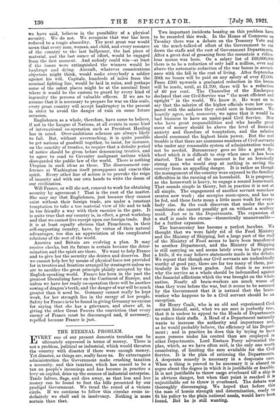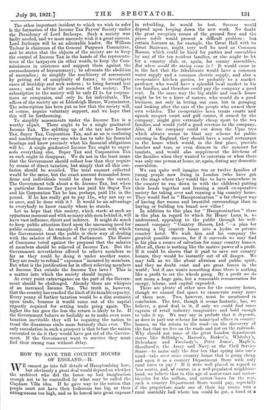THE ETERNAL PROBLEM.
EVERY one of our present domestic troubles can be ultimately expressed in terms of money. There is not a problem, political or industrial, which would threaten the country with disaster if there were enough money. Yet disaster, as things are, really faces us. By extravagant administration the Government make crushing taxation a necessity, and this taxation, which has ceased to be a tax on people's incomings and has become in practice a levy on capital, dries up the sources of industrial enterprise. Trade falters, flags, and dies away, so that less and less money can be found to foot the bills presented by our prodigal Government. We tread the round of a vicious circle. 11 we continue to follow this circular route in- definitely we shall end in insolvency. Nothing is more certain than that. Two important incidents bearing on this problem have to be recorded this week. In the House of Commons on Tuesday there was a debate on the Treasury Vote and on the much-talked-of effort of the Government to cut down the staffs and the cost of Government Departments.
After a great deal of groaning from the mountain a ridicu- lous mouse was born. On a salary list of 169,000,000 there is to be a reduction of only half a million, over and above the automatic reduction of the war bonus in accord- ance with the fall in the cost of living. After September 30th no bonus will be paid on any salary of over £2,000. From 1500 upwards a graduated reduction in the. bonus will be made, until, at £1,700, there will be a reduction of 60 per cent: The Chancellor of the Exchequer declared that our Civil Service was "the most efficient and upright" in the world. We know it. He went on to say that the salaries of the higher officials were low com- pared with the salaries they could earn in business. We heartily agree, and, moreover, we agree that it would be bad business to have an under-paid Civil Service. Men who have great responsibilities and who handle great sums of money should be above the level of financial anxiety and therefore of temptation, and the salaries should command the highest brain power. But the real trouble is that there are enormous numbers of Civil servants who under any reasonable system of administration would not be needed. Bureaucracy goes on like a great fly- wheel which it is difficult to stop when once it has been started. The need of the moment is for an heroically strong man who would stop at nothing in saving the country from an appalling danger. It is rather as though the management of the country were exposed to the familiar difficulties in the running of an household. It is proposed, as the housework is heavy, to engage a second housemaid. That sounds simple in theory, but in practice it is not at all simple. The engagement of another servant somehow creates new work • she occupies room-space, and has to be fed, and these facts mean a little more work for every- body else. So the cook discovers that under the new conditions she cannot possibly get on without a scullery maid. Just so in the Departments. The expansion of a staff is made the excuse—theoretically unanswerable— for a further expansion. The bureaucracy has become a perfect incubus. We thought that we were fairly rid of the Food Ministry and the Ministry of Shipping, but a large part of the staff of the Ministry of Food seems to have been transferred to another Department, and the Ministry of Shipping is still carrying on and seems lately even to have grown a little, if we may believe statements made in the debate. We repeat that though our Civil servants are undoubtedly worthy of good pay, there are far too many of them, par- ticularly in the lower grades. And there is no reason why the service as a whole should be indemnified against the financial afflictions which the war brought on the whole nation. Nearly all brain-workers are much worse off than they were before the war, but it seems to be assumed by the Government that it is natural that the brain. worker who happens to be a Civil servant should be an exception. Sir Henry Craik, who is an old and experienced Civil servant himself, said, what we are sure is perfectly true, that it is useless to appeal to the Heads of Departments to reduce their staffs. A Head of a Department naturally wants to increase the authority and importance and, as he would probably believe, the efficiency of his Depart- ment ; and in practice he does this by trying to have more persons under his control than are employed in other Departments. Lord Eustace Percy advocated the plan, which, as we have often said, is the only one worth considering, of limiting the sum available for the Civil Service. It is the plan of rationing the Departments. A desperate remedy is necessary in a desperate case. Whena thing is proved to be necessary it is absurd to argue about the degree in which it is justifiable or feasible. It is not justifiable to throw cargo overboard till a ship is in obvious danger, but when that point is reached it is unjustifiable not to throw it overboard. The debate WAS thoroughly discouraging. We hoped that before this the man of heroics strength and determination, ready to fit his policy to the plain national needs, would have been found. But he is still wanting. The other important incident to which we wish to refer Is the formation of the Income Tax Payers' Society under the Presidency of Lord Inchcape. Such a society was badly needed, and we most sincerely wish it a great suocess. Lord Inehcape will be an admirable leader. Sir William Trdoar is chairman of the General Purposes Committee, and he states that the objects of the society are to keep the control of Income Tax in the hands of the representa- tives of the taxpayers (in other words, to keep the Com- missioners in existence and support them against the encroachments of bureaucracy) ; to advocate the abolition of anomalies ; to simplify the machinery of assessment by getting rid of complexity of forms ; to investigate cases of hardship and seek redress ; to bring forward test cases ; and to advise all members of the society. The subscription to the society will be only El is. for corpora- tions or companies, and only 5s. for individuals. The offices of the society are at Iddesleigh House, Westminster. The subscription has been put so low that the society will, of course, require voluntary support, and we hope that this will be forthcoming. To simplify assessments under the Income Tax is a worthy object. There ought to be a single graduated Income Tax. The splitting up of the tax into Income Tax, Super Tax, Corporation Tax, and so on is confusing and maddening to every one who has to take his financial bearings and know precisely what his financial obligations will b.3. A single graduated Income Tax ought to super- sede everything else. Super Tax and. Corporation Tax as such ought to disappear. We do not in the least mean that the Government should collect less than they require by means of direct taxation, but simply that all this con- fusion should be avoided. The total amount collected would be the same, but the exact amount demanded from firms and individuals would be clear from the outset. The Government talk about a 6s. Income Tax, but when a particular Income Tax payer has paid his Super Tax and his Corporation Tax he has, perhaps, paid Ils, in the pound. If he has really got to pay lie., why not say so at once, and be done with it ? It would be an advantage to everybody to know exactly where he stands. Let us hope that this society, which start3 at such an opportune moment and with so many able men behind it, will have vast influence, direct and indirect. It might do much to keep public attention fixed upon the unceasing need for public economy. An example of the cynicism with which the Government treat the public is their way of dealing with the salaries of Members of Parliament. The House of Commons voted against the proposal that the salaries of members should be relieved of Income Tax. But the Government nevertheless offered to relieve members so far as they could by doing it under another name. They are ready to refund" expenses "incurred by members. But what is the justification for in effect relieving members of Income Tax outside the Income Tax laws ? This is a matter into which the society should inquire.
At every point extravagance on the part of the Govern- ment should be challenged. Already there are whispers of an increased Income Tax. The truth is, however, that the country has reached the limit of its taxable capacity. Every penny of further taxation would, be a dire restraint upon trade, because it would come out of the capital urgently required for setting trade going again. The higher the tax goes the less the return is likely to be. If the Government behave so foolishly as to make even more taxation inevitable they will be requiring the nation to tread the disastrous circle more furiously than ever. The only consolation in such a prospect is that before the nation consented to do it they would have got rid of the Govern- ment. If the Government want to survive they must find their strong man without delay.



































 Previous page
Previous page